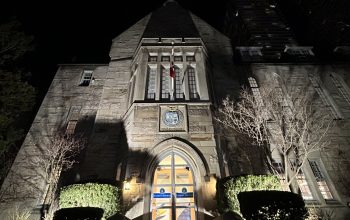Is there more the university should do to support student mental health?
Emily Barber NEWS EDITOR
Photo: WIKI
With exams and semester deadlines looming on the not-so-distant horizon, it seems appropriate to provide the following brief summary and exposition of the mental health services provided by the University of Toronto (U of T) St. George Campus.
The Health and Wellness Centre on the second floor of the Koffler Centre at the corner of St. George and College Street provides psychotherapy, pharmacotherapy, group therapy, and on-location counselling. There is also a distress hotline called Good2Talk that operates 24/7/365 that provides a free, confidential helpline with professional counselling, information, and referrals for mental health, addiction, and well-being. Good2Talk can be accessed at 1-866-925-5454.
The Gerstein Crisis Centre is a 24-hour community-based mental health service. Among these services are a telephone crisis line at 416-929-5200, a mobile crisis team, a substance use crisis management and follow-up team, short-term residential crisis beds, and mental health and justice short-term residential crisis beds. The centre has two locations — one on 1045 Bloor Street West and another at 100 Charles Street East.
An online resource is available at linkme.care, in which students can take a mental health survey, get matched to a therapist according to the survey information provided, and book an appointment that will get confirmation within 48 hours. The website gives an overview of the therapists and the services they provide. The Facebook page of the University of Toronto Students’ Union (UTSU) provides direct access to the link.
The mental health mentorship program, Peers with Ears, seeks to open up dialogue and build solidarity between students. The program is not meant to replace any professional mental health services, but it acts as a supplementary service in order to improve student life at U of T. Students can sign up as a mentor or as a mentee. Additional information about Peers with Ears can be found on the UTSU Facebook page, complete with a registration link.
The new, controversial Mandatory Leave of Absence Policy (MLOA) is U of T’s last-resort measure for students severely struggling to balance school and mental health. The Policy, whose 18-month journey to a reality faced criticism from the Ontario Human Rights Commission (OHRC) due to the lack of mental health professionals involved in early drafts, drew protests from students from all three U of T campuses, Ryerson University, and York University when it was signed by the Governing Council on June 27, 2018. While the Policy is intended only to be used in the most extreme of cases and is made in consultation with mental health professionals, it is ultimately implemented at the discretion of the Governing Council’s Vice-Provost, not by any experts in mental health.
It is worth noting that U of T’s 2018–19 operating budget reveals that the $1.5 million dedicated to mental health services amounts to approximately 0.06 percent of the university’s $2.68 billion budget.
Please note that this is not a comprehensive list of mental health services. Should there be additional services that ought to be drawn to the attention of The Mike, please feel free to notify [email protected]. Over the past two years, The Mike has been making a conscious effort to draw attention to both the benefits and the shortcomings of U of T’s mental health framework, and accordingly would appreciate any feedback from our readers.




